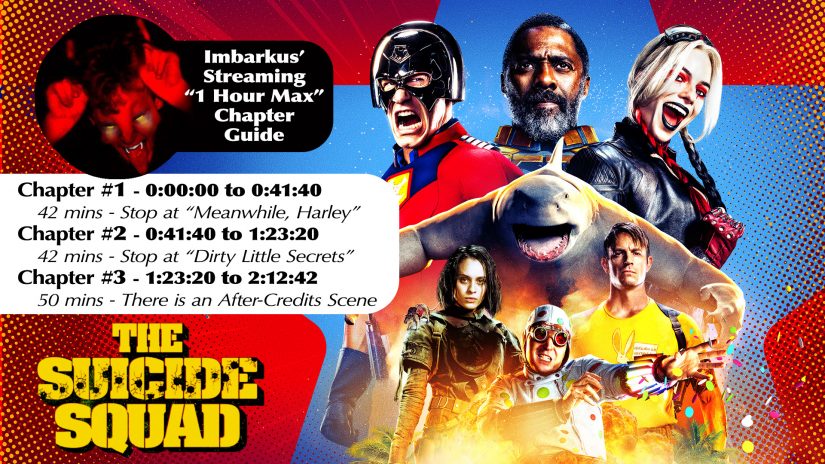Does “The Suicide Squad” Redeem the Suicide Squad for the “DCEU?”
The DC Films Context of “The Suicide Squad” and a Spoiler-Free Streaming Review
Three and a Half Starros out of Four – “Delightfully Disturbing with a Good Heart”
8/24/2022 EDIT: Changes the title from “‘The Suicide Squad’… The! Spoiler-Free Review” as I no longer feature the Simpsons reference I was so unreasonably proud of as the anchor image.
7/12/2022 EDIT: I added the Streaming “1 Hour Max” Chapter Guide and the Nanaue GIF.
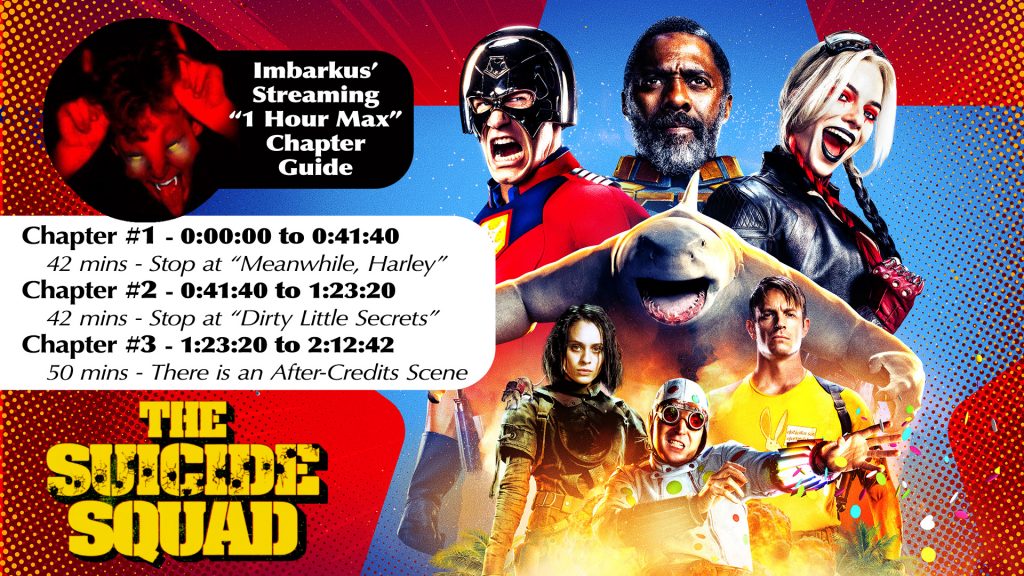
Comedic gore is still a new and rare commodity in big Hollywood movies, particularly done well. The slasher genre came into its own in the 70’s and 80’s, allowing horror films to explore all the possibilities of on-screen gore. That envelope was opened forty years ago, and has been pushed as far as it can go in terrorizing directions. Using the technique for different effect, like that of comedy, was an underground cinema affair, left to studios like Troma, birthplace of the infamous Toxic Avenger. James Gunn, the director who helmed 2021’s The Suicide Squad during a hiatus between his mega-earning Guardians of The Galaxy movies for Marvel Studios, cut his teeth at Troma Studios. Even still, given his Guardians track record, comedic gore spiced with black humor is a daring direction for a director to take a multi-million dollar “cape flick.”
After all, no one’s been able to quite recreate the recipe for R-rated gory and funny super-hero sauce, over a big box office meal, since Fox’s Deadpool series.
Given the dour headlines regarding box office performance during the second week for James Gunn’s The Suicide Squad, and the ongoing COVID-19 pandemic muddying all the normal results and conclusions studios and pundits would use to estimate the popularity of a film, the size of its audience remains uncertain. But if you’re out there reading this right now—mythical mirthful gore-hound—and you haven’t yet seen it, let me reassure you. The Suicide Squad is gory and funny and heartfelt and great: it’s the Tucker and Dale Vs. Evil of super-hero movies.
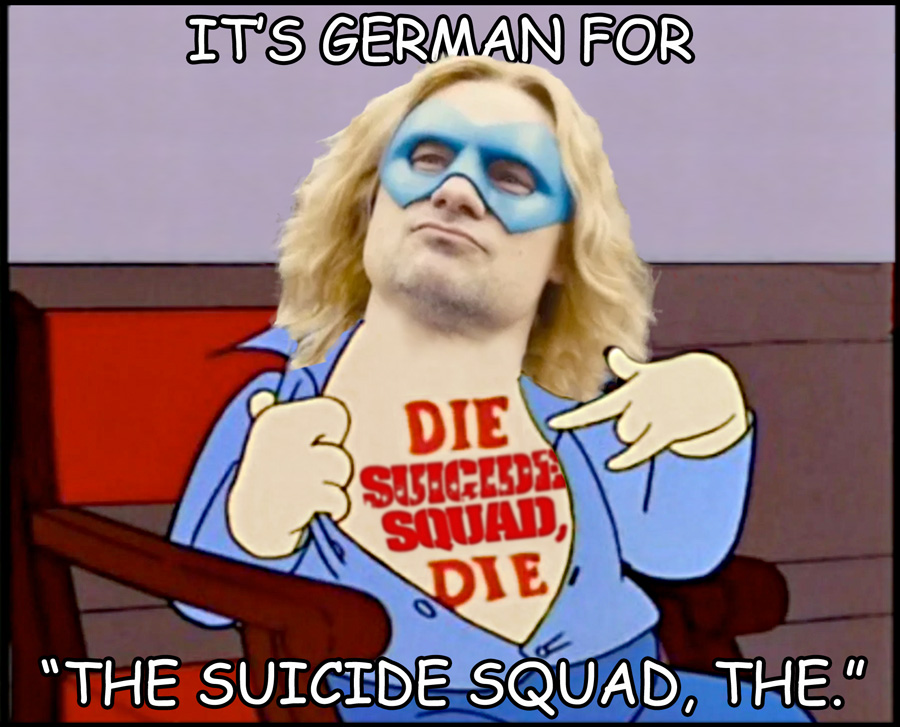
When is a Bomb Not a Bomb?
When it Doesn’t Blow!
I suppose that above comparison places the movie squarely in the risky territory of becoming a “cult” film as Tucker and Dale has become. Cult films have traditionally been low-budget slow-burns; innovative affairs that find their audience gradually over time, who then in turn log multiple viewings of the film as that audience’s enthusiasm for it grows and they find their fellow enthusiasts.
WB wasn’t looking for something cult.
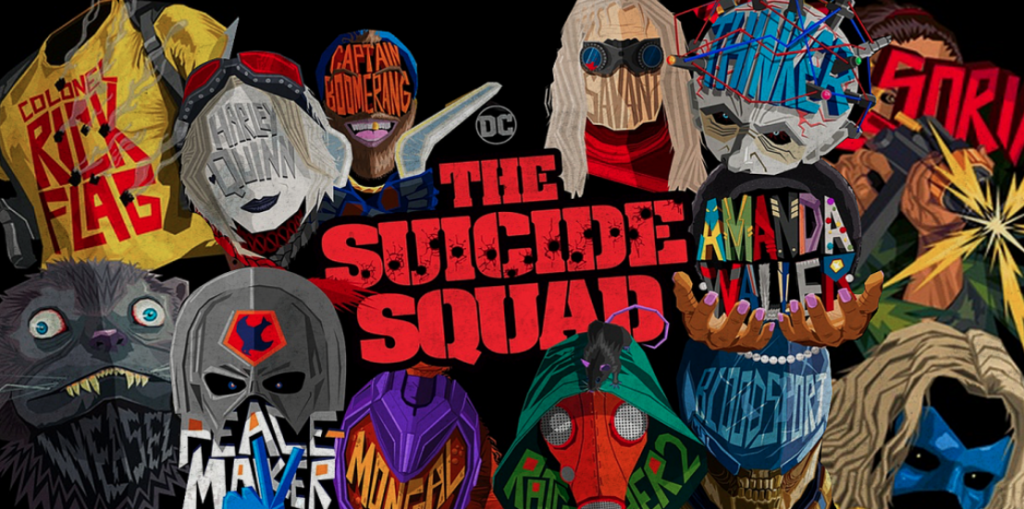
Spending a huge budget on a cult film—with something like The Adventures of Buckaroo Banzai Across the 8th Dimension—is usually a recipe for studio disappointment with financials, and stunted series with cancelled sequels. This is because the box office provides a limited time window in which to make your money, before your movie is old inventory and must clear way for new inventory. And as Matt Damon recently pointed out in his recent Hot Ones interview, the advent of streaming has eliminated the DVD and Blu-Ray profit that used to provide back-end profits tied to a specific film as well. The ongoing subsumption of these two markets into streaming services hides these numbers from overall audiences and press. Only Warner Brothers has the true detailed viewership numbers of how the movie was viewed through the HBO Max streaming service.
This turn of events is all very nerve-wracking. Fans of DC characters on film have already struggled with supporting adaptations from Warner Brothers that disappointed the studio when it came to numbers. They’ve already formed a “cult” of sorts, in order to back a director the studio ditched. The “DC Films” audience had become fractured, factionalized, and befuddled long before coming into this movie. Nobody involved and emotionally invested wants another lost cause, but in some cases that is because the audience hasn’t moved on from the last lost cause: the fabled #SnyderVerse. This has led to a revival of the #ReleasetheAyerCut campaign, to which I am indifferent. Whatever remains in the can for 2016’s Suicide Squad, now’s not the time to push it. It strikes me as petulant to try and saturate online talk with another director’s-cut hashtag when an accomplished director with the perfect DC cult movie possibly passes them by, ignored or unfairly maligned.
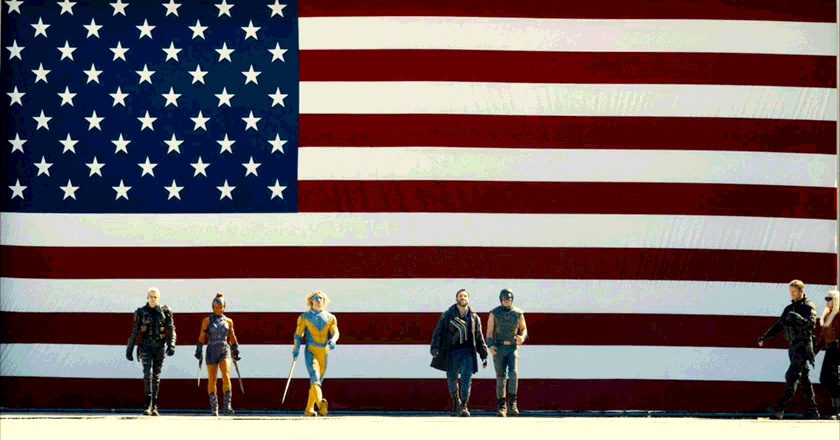
James Gunn has contended that Warner Brothers gave him extraordinary freedom on the film. Stephen Colbert of Screenrant (no, not that Stephen Colbert) has asserted that the way forward for Warner Brothers and “DC Films” is to continue trust their directors, and news of their interference-free approach on the production of this film was encouraging. I can only hope WB agrees. This brilliant and funny film has enough going against it already, through no fault of its own. It would be truly sad to see the familiar villain of “WB executive adjustments” once again rear its ugly head.
So. The Suicide Squad may not have drawn you to theaters. But it’s streaming through September 5th on HBO Max. And if there’s one thing we know about these new streaming platforms, is that the people who run them certainly have very detailed viewership numbers.
So do yourself a solid—and help out a good cause—and pull it down one way or another. You’ll thank me afterwards. And you’ll thank James Gunn.
Missions Succeed or Fail in the Planning Phase
Gunn’s first clever decision with the film is to turn adversity into advantage. The DC cinematic universe is made up of about half the number of movies released in the Marvel Cinematic Universe (12 to 24 at this time) and there are just so many villains already established on-screen to choose from to fill out all-villain squad. Part of the issue with the strange, grueling theatrical Suicide Squad release from 2016—the third movie overall in the “DC Extended Universe”—was its character introductions. The script was tasked with introducing the premise as well key Batman mythos villains like Harley Quinn, Deadshot, and Killer Croc while also reintroducing a new interpretation of the key character of the Joker. The end result of the effort turned out to be a mishmash of over-long sequences, controversially cut by committee to clips and flashes, and layered with individual motion graphics overlays while the movie’s soundtrack does the heavy lifting.
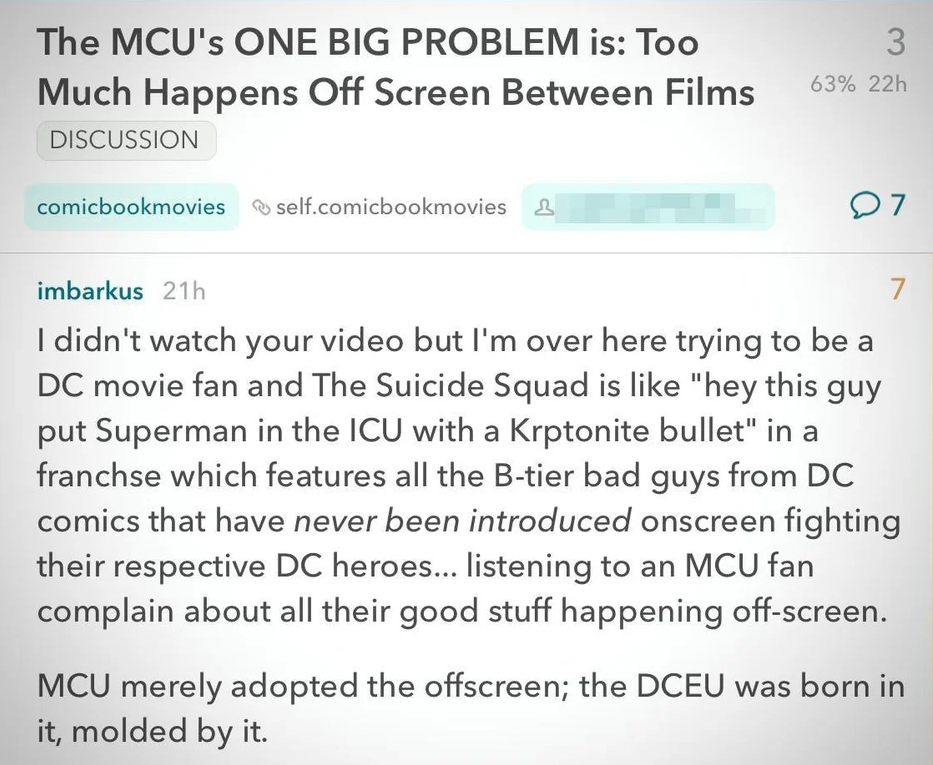
The Suicide Squad, instead, builds its expendable team from the vast swaths of B-tier comics history. Comic books, having been pumped out on a monthly basis on the cheapest pulpy paper over the decades, have dreamed up a vast array of quirky, gimmicky, broad-strokes characters that would never see the light of day on screen without an effort like this. Tying his film to these characters frees Gunn from any overhead conveying the import and impact of these bad guys on the world before their time in prison. It also lets him play with the disposable nature of the characters inherent to the Suicide Squad comic premise: all these comic book bad guys must do the bidding of Amanda Waller (played with fantastic dripping deadpan by Viola Davis) and her secret government task force, or she’ll remotely detonate a tiny bomb implanted in the base of their skulls. In exchange for completed missions, these hardened villains get ten years off their sentence.
The Suicide Squad is a comedy. A pretty damn funny one, too. The meta of the meat grinder of Waller’s Task Force X is fertile ground for laughs in Gunn’s film. Connections to the previous film are there to be drawn and enjoyed by fans, or safely ignored by viewers starting fresh.
The Suicide Squad is an inspiring super hero team-up film. It might even be WB’s best attempt at one yet, or maybe it’s just the one that appeals most to me because its team of world-saving heroes are built from the misfits of this universe.
So, with the premise quickly established and the misfit characters efficiently introduced, The Suicide Squad proves itself smarter and breezier than its ancestor right out of the gate. And the movie quickly establishes consequences to the premise: one of the promotional taglines of the film is “Don’t Get Too Attached.” It’s a clever blurb, and good advice… but impossible to follow.
Teams Form or Fall Apart in the Field
Gunn writes characters that come across as people. These are all comic book characters with sometimes ridiculous powers and backstories, in a set of ludicrous circumstances at practically any point in the film. But Gunn wisely grounds them in humor and genuine human reaction, layering relatability and giving the audience time to care about each and every team member, whatever their ultimate fate.
The center of the film is Bloodsport, aka Frank DuBois, played by Idris Elba. He steps into a role that seems like it might have at first been conceived for Will Smith’s Deadshot from the first film, complete with a fraught relationship with his daughter. But by the end of the film he makes you so glad and grateful for his unique and sardonic world-weary mercenary.
It would honestly be a spoiler to detail the major characters in the film; I recommend you go in blindly. The entire cast deserves accolades; there might be some small parts in this often-lethal narrative, but there are no small actors here. I’d like to give particular accolades to:
Joel Kinnaman as Colonel Rick Flag – He had bright moments of comedy in the first film, but in this one he blossoms into a key dependable source for laughs. He’s caught my notice, and as a result I’m even closer to pulling the trigger on watching the Apple+ series in which he stars, For All Mankind.
John Cena as Peacemaker – A wrestler with comedic timing? Yup. And how. His interplay with Bloodsport is some of the best fun in the film.
Nathan Fillian as T.D.K. – A delight and a tour-de-force just to watch him use his powers.
David Dastmalchian as Polka-Dot Man – There is a running gag involving the origin of Abner Krill, the Polka-Dot Man, that is one of the funniest touches of the film. I didn’t recognize David from his role in Ant-Man at first—a testament to how transformed he is in the part despite a distinctive face. After recently learning what the actor had overcome to find his success, I’m even more touched by his performance.
Michael Rooker as Savant – Count on The Rook to add proper gravity to the situation.
Sylvester Stallone as King Shark – I just want everyone to know that Sylvester Stallone gets solid laughs as well as feels as Nanaue.

Daniela Melchior as Ratcatcher 2 – This role marks the English performance debut for this young Portuguese actress. She’s perfect, moving and mesmerizing, and becomes the real emotional center of the film.
Julio Ruiz as Milton – The most unexpectedly involving character performance of the film.
Finally I have to take a little extra time to praise Margot Robbie’s turn once again in the role of Harley Quinn. This movie marks her third appearance in the role, and with it I think it’s clear Dr. Harleen Quinzel has the strongest character arc of any character in the “DCEU”—an acronym I use in quotes since learning it was coined on accident by a journalist on Twitter. I’ll slip that she spends a fair portion of the movie on an individual arc before rejoining the squad, and this adventure really caps off her journey and the evolution of her character with an appropriate end to go with the beginning and middle already told. Developed originally from Batman: the Animated Series, the character of Harley Quinn has always had to emerge from the shadow of her conception as victim of Joker’s abuse, in the comics, in the animated adaptations, and now, more fully, in her cinematic incarnation. Joker’s never even mentioned in this piece, and yet her final declaration of independence plays out in a beautiful, poetic, blood-soaked sequence that also happens to be one of the soundtrack standout moments of the film for me.
Style AND Substance, Chutzpah AND Class
This movie both sounds and looks great. The tropical setting for the film serves it greatly and the day-lit aesthetic both serves the movie’s visual palette and helps it stand out from the muddy and dark 2016 effort. There are so many wonderful shots and vignettes with stylish arrangement of cinematography, but the film never pulls you out of its world with unnatural framing or camera movement. Gunn’s style is very organic—he favors solid pans and arcs—and here he references and works grind-house influences into the framing, pacing, and design of this piece, particularly in its first half.
Part of the comedy approach to Waller’s meat grinder is, in fact, this low-rent set dressing. At the open of the movie, you the sense that the Task Force X initiative been operating for a while, years since she introduced the controversial idea and ended up owning it. There’s a grunge and a banality to her wardrobe and her office headquarters, telling an implied story of budget cuts replacing equipment like slick iPads to detonate heads with low-tech switches and red buttons to correct agents who go “off mission.” Viola Davis’ performance as Waller drips with disappointment and frustrated venom within pink polyester. She’s hysterical.
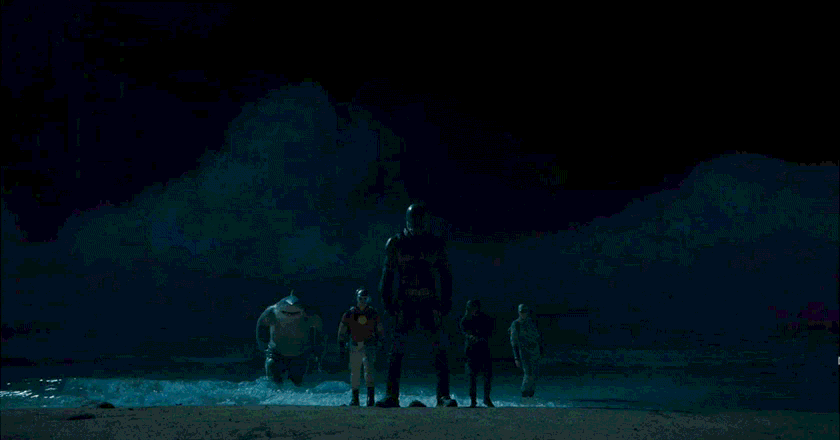
Apparently, the movie owes a lot of design influence of the 1980’s run of Suicide Squad the comic, something I must admit to never having read. I can, however, attest to the stylish grind-house design ascetic and garish colors and day-blown lighting scheme as coalescing into something beautiful overall, regardless of your appreciation for the comics.
The soundtrack’s integration with the movie is also top-notch. 2016’s film also got lathered in some good tunes (rather awkwardly), but the cuts in this one are deep, unquestionably cool, and way more appropriate and integrated with the on-screen themes and action. Gunn’s selection of underused and forgotten tracks is complimented by his ability to blend them into a scene—sometimes thematically, sometimes via in-world placement, often both—in a way that always adds impact and emotion. There’s no better example of this than the culmination of the movie’s rising action, a beautiful slow-motion over-exposed shot of the squad walking through a sun-drenched rainstorm, set to the Pixie’s “Hey.”
The film’s structure is clever as well, thorough and complete with every plot thread and character it establishes eventually tied back in to the story in a satisfying way. WB is a studio often guilty of adapting DC IP into over-long epics. The Suicide Squad is just over two hours, and though it could be shorter, it’s very respectful of your time. It’s a refreshing feeling as you settle into this film to be in the hands of a director you can entirely trust. Nothing is wasted, and the movie jumps around in time, establishing multiple internal cliffhangers. Each one comes together and pays off satisfyingly. I almost got the feeling the film was having a go at picking up an unintentional thread from its ancestor: the 2016 movie jumped around disjointed in time largely due to its relay-style editing process. In The Suicide Squad, James Gunn amazingly takes the staccato pace of film-by-committee… and makes it an intentional aspect of the way the film lays out its story for the audience, to fantastic effect. Nothing is convoluted, and everything clicks like clockwork.
Eventually the film stretches past these humble stylistic roots and reaches epic scale in proud super-hero movie fashion, but with a goofy comedic twist. It’s great and over-the-top. It’s probably the decision that made the film an expensive one to make, presenting this rag-tag team with a world-ending threat to tackle and a massive effects spectacle to cap their adventure.
Maybe WB will decide that this big finish wasn’t worth it. This movie deserves to be a summer blockbuster and it’s not going to be. Not unless the streaming numbers on HBO Max please Warner Brothers. Like original Harley Quinn herself, DC fans have been conditioned to cringe at the possible judgment of the “boss.” And maybe a more modest climax would have balanced the budget better. It’s a crowd-pleasing moment, in a time when people are sadly uncertain about the wisdom of assembling and pleasing crowds.
For me, it was worth it for the Polka-Dot Man bit alone.
Laugh at Your Fears
And Watch Their Power Fade
It’s hard for me to put my finger on specific negatives about this film. I enjoyed the thing so thoroughly and immensely I’ve grown a bit blind to its flaws, and indeed I have seen the movie a few times already… every time on HBO Max… all the way through. For me, pandemic concerns and my own proclivity to want to enjoy the conveniences of movies at home led to that decision. I’d imagine that’s true for a lot of the audience. The executive decision at Warner Brothers to release nearly its entire 2021 slate to HBO Max for no additional charge has accelerated this effect in a lot of viewers.
I did, however, miss the laughter of a crowd during the film. Gunn earned it; I bet it would have been there. It was in the room, at my house, for my small crowd of family. For what that’s worth to WB.
At the very least, if the studio is so concerned—as they were back in the halcyon days right after Batman V Superman—about second-week drop, it should at least make sense that moviegoers aren’t going to buy additional tickets for money to rewatch the film if they can do so at home for free in the second week of its release.
It’s also possible some audiences might find the film a little mean-spirited, particularly if they give up on it before it really shows its heart. The opening scene in particular can leave you feeling a bit adrift as to which characters you should start caring about. The comedic gore I’ve mentioned is front-loaded, and this is very clearly not a movie for young kids. Perhaps more damning to its wide-scale appeal, however, is the fact that this isn’t just an adult-oriented comedic cape flick full of gory fun and self-referential winks like Deadpool.
The Suicide Squad instead, like Tucker and Dale Vs. Evil, laughs at death itself. And with current events, that theme might just be a bit too much for some people right now. It might just be a bit too ahead of the curve in asking us to let go of fear and sadness and laugh at our mortality.
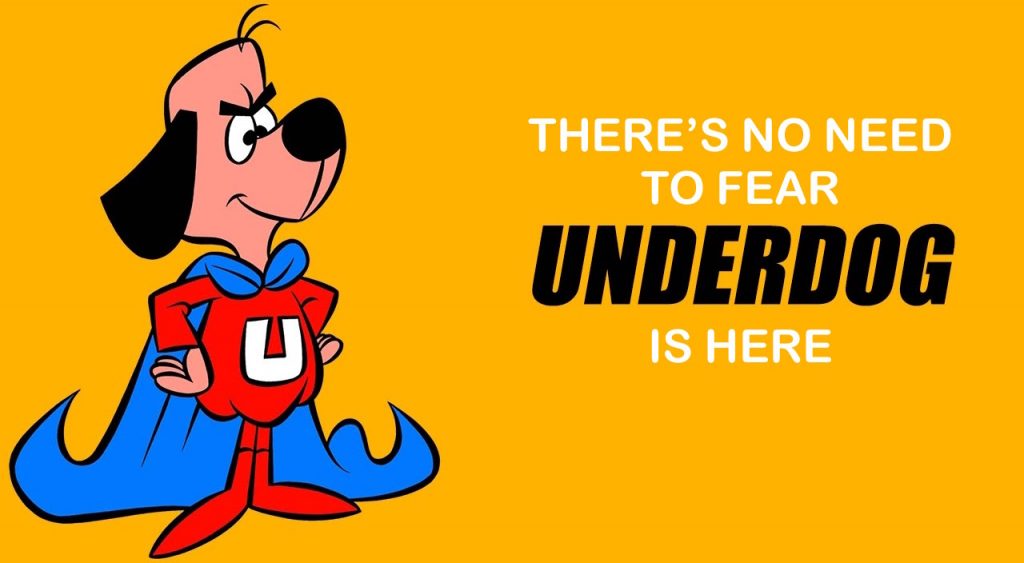
I suppose the results and headlines for this movie have placed it right in my wheelhouse: once again I am in the familiar position of rooting for the underdog. I suppose that’s why I decided to write this piece. I wanted to motivate fellow movie-goers and DC fans to give this one a second chance, and make sure that James Gunn and the talented cast and crew that brought us this magnificent and unusual gift of a movie are rewarded for it, at the very least, in praise. And streams.
I want more of this. I’m not sure if the character getting spun out into a streaming series—as revealed in a post-credits teaser—is the one I want to continue to follow, but I’ll happily follow James Gunn anywhere he wants to lead me in this universe. He’s taken it in a different direction, one that doesn’t ignore or invalidate anything that’s come before, but rather builds the DC movie universe into something grander and yet more intimate than its been before.
Here’s to hoping this awesome big budget cult film finds its appreciation with both its audience and its masters. See it! Then see it again!
Advertisement

